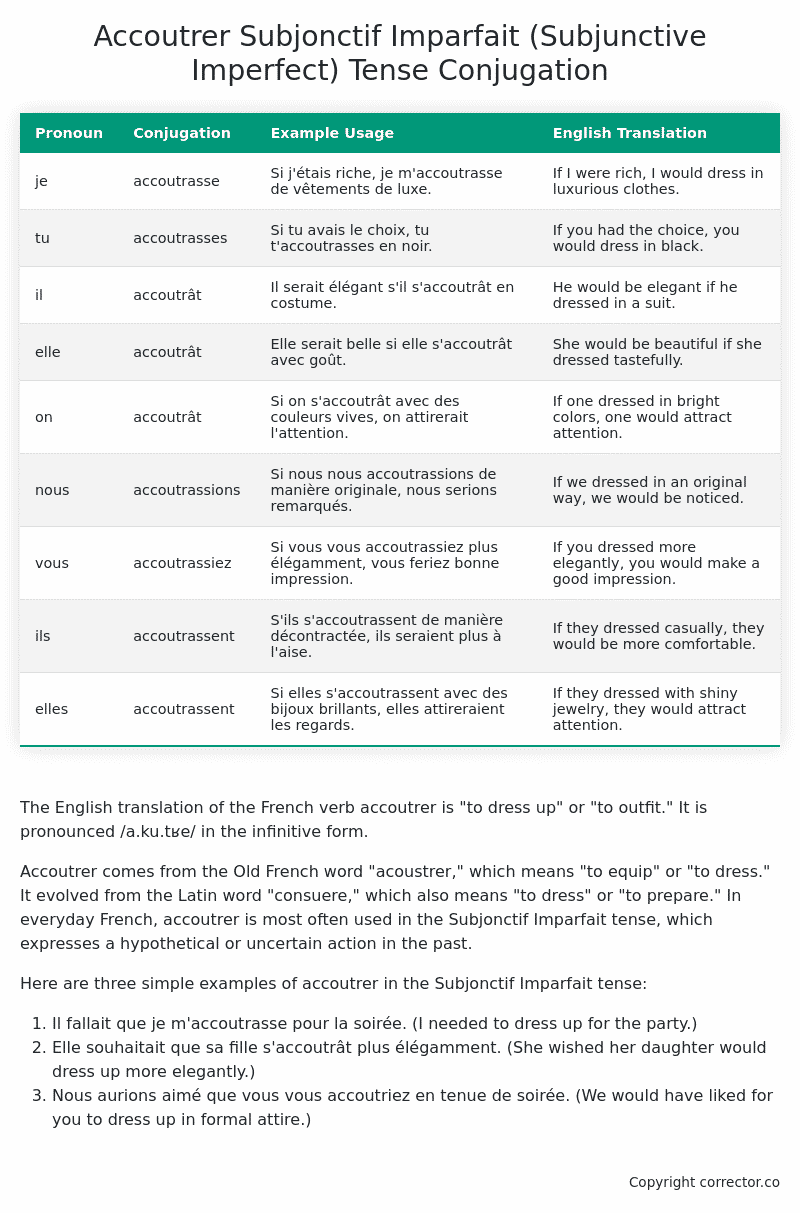Subjonctif Imparfait (Subjunctive Imperfect) Tense Conjugation of the French Verb accoutrer
Introduction to the verb accoutrer
The English translation of the French verb accoutrer is “to dress up” or “to outfit.” It is pronounced /a.ku.tʁe/ in the infinitive form.
Accoutrer comes from the Old French word “acoustrer,” which means “to equip” or “to dress.” It evolved from the Latin word “consuere,” which also means “to dress” or “to prepare.” In everyday French, accoutrer is most often used in the Subjonctif Imparfait tense, which expresses a hypothetical or uncertain action in the past.
Here are three simple examples of accoutrer in the Subjonctif Imparfait tense:
- Il fallait que je m’accoutrasse pour la soirée. (I needed to dress up for the party.)
- Elle souhaitait que sa fille s’accoutrât plus élégamment. (She wished her daughter would dress up more elegantly.)
- Nous aurions aimé que vous vous accoutriez en tenue de soirée. (We would have liked for you to dress up in formal attire.)
Table of the Subjonctif Imparfait (Subjunctive Imperfect) Tense Conjugation of accoutrer
| Pronoun | Conjugation | Example Usage | English Translation |
|---|---|---|---|
| je | accoutrasse | Si j’étais riche, je m’accoutrasse de vêtements de luxe. | If I were rich, I would dress in luxurious clothes. |
| tu | accoutrasses | Si tu avais le choix, tu t’accoutrasses en noir. | If you had the choice, you would dress in black. |
| il | accoutrât | Il serait élégant s’il s’accoutrât en costume. | He would be elegant if he dressed in a suit. |
| elle | accoutrât | Elle serait belle si elle s’accoutrât avec goût. | She would be beautiful if she dressed tastefully. |
| on | accoutrât | Si on s’accoutrât avec des couleurs vives, on attirerait l’attention. | If one dressed in bright colors, one would attract attention. |
| nous | accoutrassions | Si nous nous accoutrassions de manière originale, nous serions remarqués. | If we dressed in an original way, we would be noticed. |
| vous | accoutrassiez | Si vous vous accoutrassiez plus élégamment, vous feriez bonne impression. | If you dressed more elegantly, you would make a good impression. |
| ils | accoutrassent | S’ils s’accoutrassent de manière décontractée, ils seraient plus à l’aise. | If they dressed casually, they would be more comfortable. |
| elles | accoutrassent | Si elles s’accoutrassent avec des bijoux brillants, elles attireraient les regards. | If they dressed with shiny jewelry, they would attract attention. |
Other Conjugations for Accoutrer.
Le Present (Present Tense) Conjugation of the French Verb accoutrer
Imparfait (Imperfect) Tense Conjugation of the French Verb accoutrer
Passé Simple (Simple Past) Tense Conjugation of the French Verb accoutrer
Passé Composé (Present Perfect) Tense Conjugation of the French Verb accoutrer
Futur Simple (Simple Future) Tense Conjugation of the French Verb accoutrer
Futur Proche (Near Future) Tense Conjugation of the French Verb accoutrer
Plus-que-parfait (Pluperfect) Tense Conjugation of the French Verb accoutrer
Passé Antérieur (Past Anterior) Tense Conjugation of the French Verb accoutrer
Futur Antérieur (Future Anterior) Tense Conjugation of the French Verb accoutrer
Subjonctif Présent (Subjunctive Present) Tense Conjugation of the French Verb accoutrer
Subjonctif Passé (Subjunctive Past) Tense Conjugation of the French Verb accoutrer
Subjonctif Imparfait (Subjunctive Imperfect) Tense Conjugation of the French Verb accoutrer (this article)
Subjonctif Plus-que-parfait (Subjunctive Pluperfect) Tense Conjugation of the French Verb accoutrer
Conditionnel Présent (Conditional Present) Tense Conjugation of the French Verb accoutrer
Conditionnel Passé (Conditional Past) Tense Conjugation of the French Verb accoutrer
L’impératif Présent (Imperative Present) Tense Conjugation of the French Verb accoutrer
L’infinitif Présent (Infinitive Present) Tense Conjugation of the French Verb accoutrer
Struggling with French verbs or the language in general? Why not use our free French Grammar Checker – no registration required!
Get a FREE Download Study Sheet of this Conjugation 🔥
Simply right click the image below, click “save image” and get your free reference for the accoutrer Subjonctif Imparfait tense conjugation!

Accoutrer – About the French Subjonctif Imparfait (Subjunctive Imperfect) Tense
Formation
Common Everyday Usage Patterns
Interactions with Other Tenses
Subjonctif Présent
Indicatif Passé Composé
Conditional
Conditional Perfect
Summary
I hope you enjoyed this article on the verb accoutrer. Still in a learning mood? Check out another TOTALLY random French verb conjugation!


